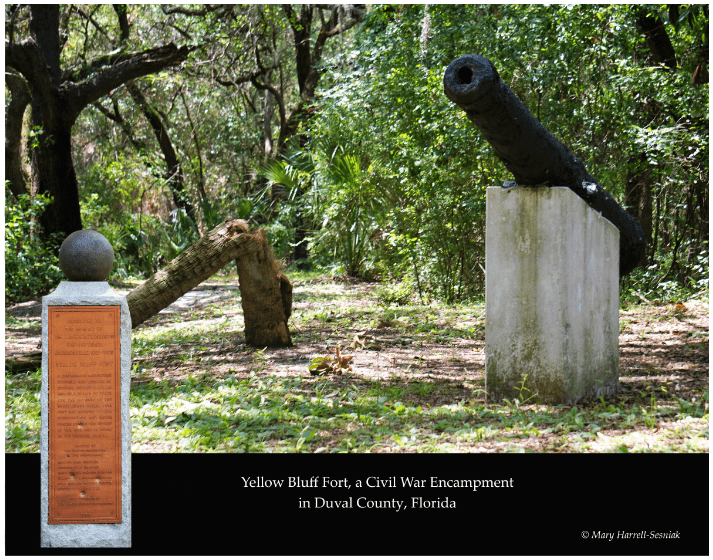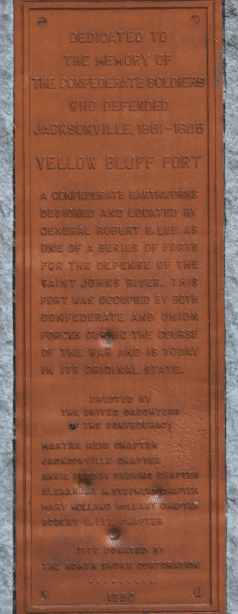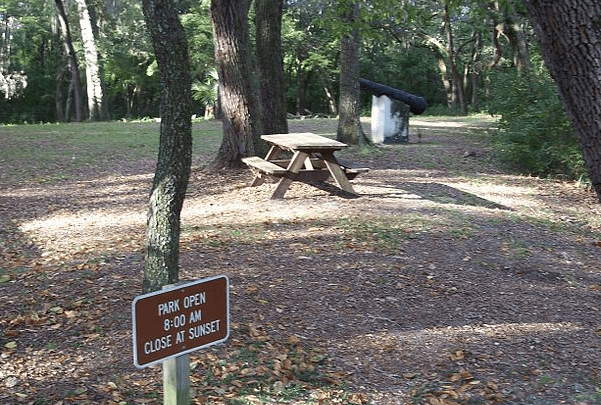Introduction: In this article, Mary Harrell-Sesniak searches old newspapers to learn more about a Civil War site she discovered while traveling in Florida. Mary is a genealogist, author and editor with a strong technology background.
If you’re like me, you appreciate historical sites – and stumbling on them by accident is so much better. Such was the case one day when my husband and I found one of the smallest Civil War sites, located in Jacksonville, Florida: Yellow Bluff Fort, which was more of an encampment than a structural fort.

Yellow Bluff Fort is one of the smallest state parks in Florida. (See state website.)
If truth be told, we were not on a genealogy outing that day, and had actually just left the zoo – but as many genealogists know, it only takes a small directional sign to get one’s attention.
So after spotting the sign, we made a sharp turn and discovered Yellow Bluff Fort. Although my 2nd great grandfather died in Jacksonville long after his Civil War service with the Union, I have no evidence he served at this fort. That didn’t stop us. As many of my genealogy colleagues know, an accidental outing might uncover tidbits useful to genealogists!
The Visit
At only 1.3 acres, the encampment at Yellow Bluff still looks like old Florida and is interesting with its assortment of cannons. The historical marker, which was placed by the Daughters of the Confederacy in 1950, only has so much room to tell the site’s story. However, it did have some tidbits which were extremely interesting:
1) The earthworks were designed by General Robert E. Lee as one of a series of forts for the defense of the Saint Johns River.
2) The fort was occupied by both Confederate and Union forces.
3) The site is in its original state.

This fort, with its history intertwined with a skirmish at Palatka (the only major Civil War battle in Olustee, Florida, 20 February 1864), and the defending of St. Augustine at various times, was alternatively occupied by Confederate and Union troops. It was also likely served by the celebrated “Colored Troops” who served in Jacksonville during 1863 and 1864. (See The Florida Memory Project of the State Library & Archives.)
Old Newspapers Tell More of the Story
With these intriguing distinctions, I was curious to see how both sides viewed what happened at this historic site during the Civil War. As with so much of my genealogical and historical research, I turned to GenealogyBank’s Historical Newspaper Archives to read the news and opinions current at that time. I found many interesting newspaper reports, some of which I’d like to share in this blog article to emphasize the importance of reading articles from all sides of an issue – to better understand our ancestors’ lives and the times they lived in.
Northern Reports of the Colored Troops
I didn’t uncover direct reports regarding the Colored Troops at Yellow Bluff, but I did find reports of their bravery and involvement in the Jacksonville area which likely included the fort.
For example, in 1862 Capt. Trowbridge’s company of Colored Troops went up the Bell River (34 miles north by car, according to Google Maps) where they destroyed rebel pickets and salt works, after which they went into Georgia.
In 1863 this newspaper published Gen. Saxton’s official report of the operations of the Colored Troops in Florida, in which he praised their bravery:
There has been constant skirmishing going on for several days, and in every action the negro troops have behaved with the utmost bravery. Never in a single instance can I learn that they have flinched.
This report from 1864 notes the passing of Col. Charles W. Fribley at Olustee, Florida; he was the leader of one of the Colored regiments.
Southern Report of March 1862
This 1862 Southern newspaper article reports that there were about 500 Federal troops at Jacksonville, and adds:
When the Yankees first landed, but few of the inhabitants had left the place, but immediately a stampede ensured, all leaving except some of decided Yankee proclivities… From two Yankee prisoners, taken the other night by our pickets, the troops were informed that it was not the intention of the enemy to march any further into the interior, but merely to hold these seaports in order to render the blockade effectual…
Northern Report of October 1862
This 1862 Northern newspaper article reports the advancement of Union troops on the:
…supposed formidable battery on Yellow Bluff, eleven miles below Jacksonville… There is room thereabouts for stirring adventure and brilliant achievement.
Southern Report of October 1862
This 1862 Southern newspaper article reports that the batteries were abandoned and that the citizens were leaving as fast as they could:
All we know certainly is that the position, the artillery, and a quantity of stores have been lost. There are many views and opinions about the disaster. We give things as we find them without comment, awaiting the future explanations which are called for.
Genealogy Challenge: Beyond the Historical Marker
Who knew you could learn so much about one of the smallest Civil War historical sites just by reading old newspapers! Rather than recount all of the surprises I uncovered in the many newspaper articles I found, I’ll leave some for another time. In the meantime, if reading about Yellow Bluff Fort has intrigued you, I challenge you to undertake an important quest:
1) Find a Civil War historical marker.
2) Pull articles from various old newspapers to see what was reported about that site at that time.
3) Find something intriguing in those newspaper reports that is not general knowledge, and share it with us in the comments section below.
4) If a report is specific to a particular person, share it online with a descendant. Make sure to credit GenealogyBank, the specific newspaper where you found the report, and the historical site that inspired your research.
Note: An online collection of newspapers, such as GenealogyBank’s Historical Newspaper Archives, is not only a great way to learn about the lives of your ancestors – the old newspaper articles also help you understand American history and the times your ancestors lived in, and the news they talked about and read in their local papers. Did any of your ancestors serve in the Civil War? Please share your stories with us in the comments section.
Related Articles:
